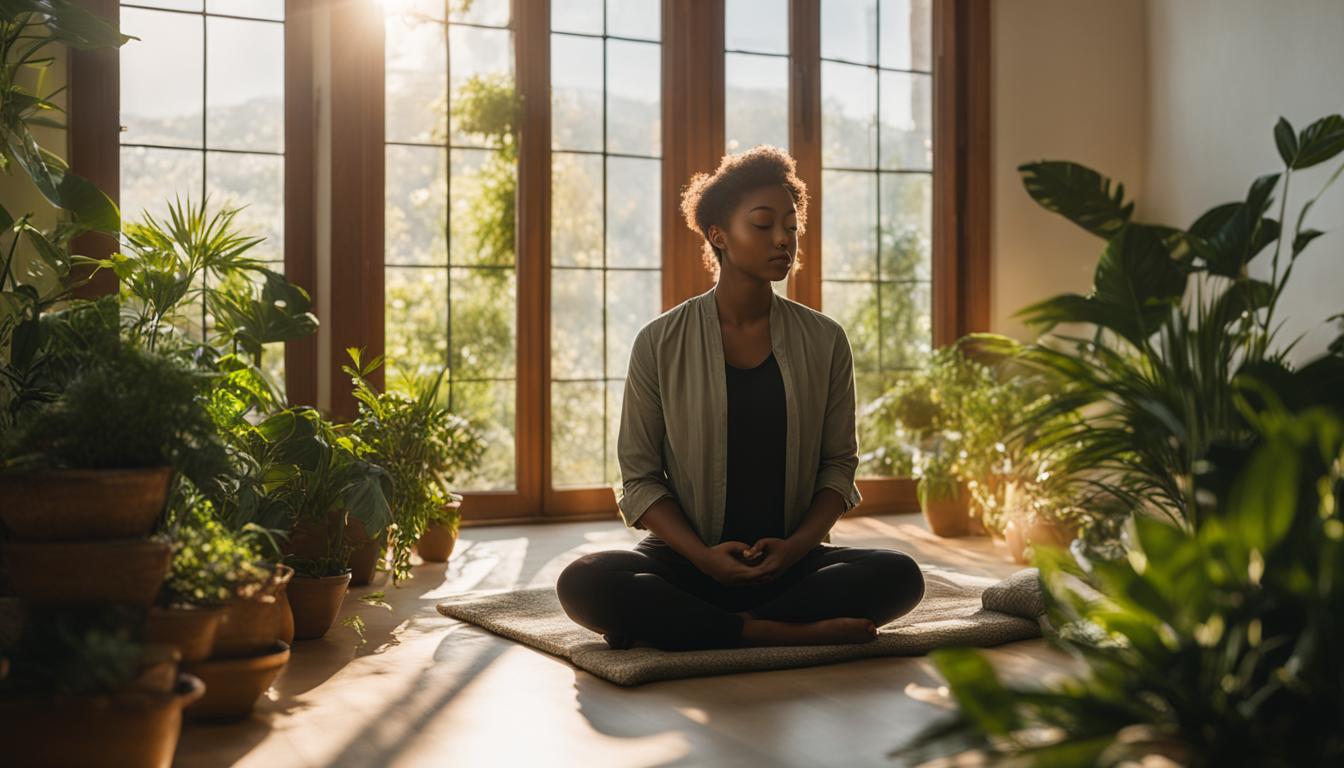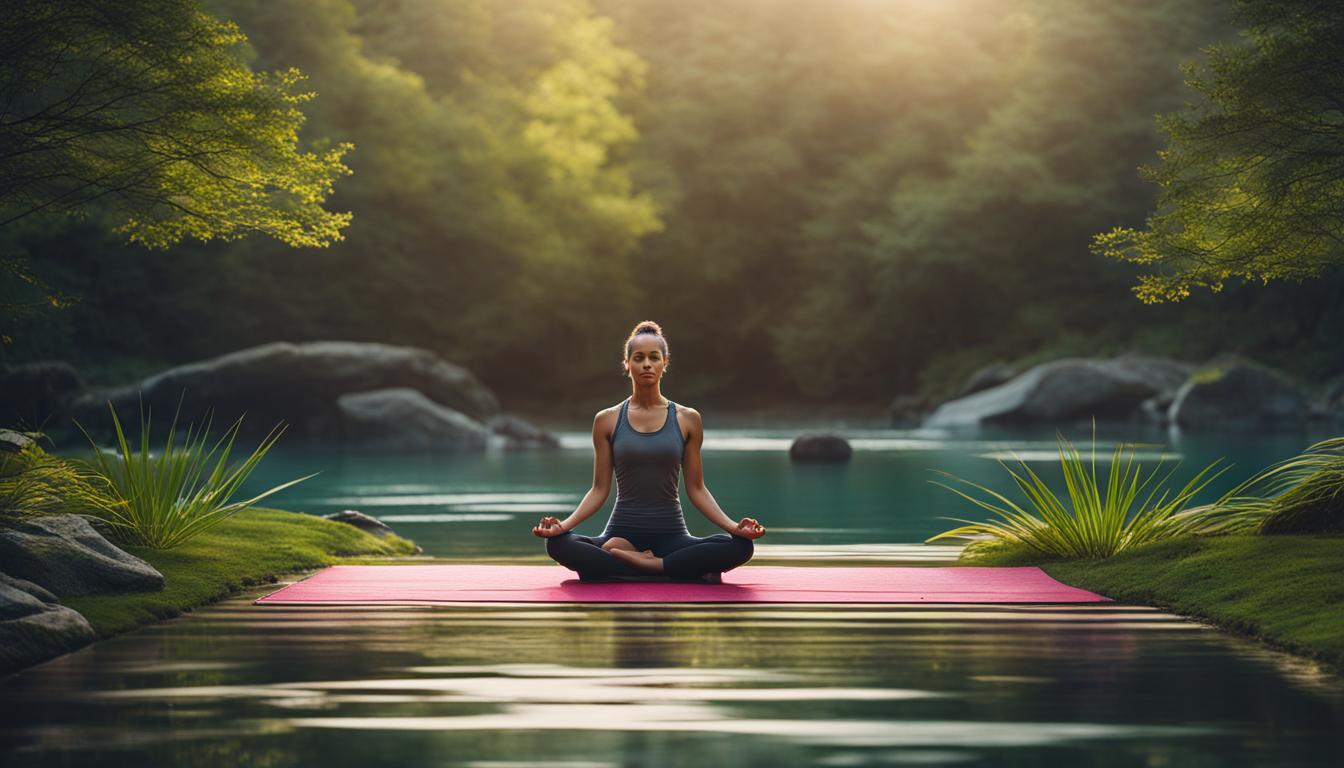Mindfulness meditation is a powerful practice that has gained popularity for its ability to enhance overall well-being and promote a greater sense of calm in our busy lives. Whether you’re new to meditation or looking to deepen your practice, this beginner’s guide will provide you with the essential information and techniques to get started.
Key Takeaways:
- Mindfulness meditation is the practice of being fully present and aware of our thoughts, emotions, and physical sensations.
- By training our minds to be mindful through meditation, we can experience benefits such as stress reduction and increased focus.
- Regular practice is key to experiencing the full benefits of mindfulness meditation.
- There are various techniques and forms of mindfulness meditation, including guided meditation and mindful breathing.
- Consistency and routine are important for establishing a successful meditation practice.
Understanding Mindfulness and Meditation
Mindfulness is the act of being fully present and aware of our thoughts, emotions, and physical sensations without judgment. It involves bringing our attention to the present moment and cultivating a non-reactive stance towards our experiences. Meditation is a practice that helps cultivate mindfulness by using various techniques such as focusing on the breath or body sensations. It allows us to train our minds to be more present and aware, promoting a sense of calm and clarity.
When we practice mindfulness meditation, we learn to observe our thoughts and emotions with curiosity and acceptance, rather than getting caught up in them. By directing our attention to the present moment, we can develop a greater understanding of ourselves and our surroundings. This heightened awareness can enhance our overall well-being and help us navigate life’s challenges with greater ease.
By engaging in regular mindfulness meditation, we can strengthen our ability to be fully present in our daily lives. It can help us develop a deeper connection with ourselves and others, as well as cultivate a greater sense of peace and contentment. Through the practice of mindfulness and meditation, we can tap into our innate capacity for awareness and improve our overall quality of life.

The Benefits of Mindfulness and Meditation
- Reduced stress and anxiety
- Improved focus and attention
- Enhanced emotional well-being
- Promotion of better sleep
- Increased self-compassion and empathy
“Mindfulness is the key to unlock the fullness of life. It allows us to appreciate the present moment and find joy in the simplest of things.” – Unknown
Whether you are new to mindfulness and meditation or have been practicing for a while, the benefits are available to everyone. By incorporating these practices into your daily routine, you can experience a greater sense of peace, clarity, and overall well-being.
The Benefits of Mindfulness Meditation
Mindfulness meditation offers a wide range of benefits for both our mental and physical well-being. Regular practice of mindfulness meditation has been shown to reduce stress, increase focus, and enhance emotional well-being. It can also have a positive impact on our physical health, such as improvements in heart health, blood pressure, and chronic pain. Moreover, mindfulness meditation fosters self-compassion and empathy towards others.
One of the key benefits of mindfulness meditation is stress reduction. By bringing our attention to the present moment and cultivating awareness of our thoughts and emotions, we can develop a better understanding of the causes of our stress and find healthier ways to manage it. This can lead to a greater sense of calm and a decrease in overall stress levels.
In addition to stress reduction, mindfulness meditation has been found to improve focus and attention. As we train our minds to be more present and aware, we become better at directing our attention to the task at hand. This can be particularly beneficial in our fast-paced, distraction-filled world, where focusing on one thing at a time can be challenging.
Mindfulness meditation also has a positive impact on our emotional well-being. By developing awareness of our thoughts and emotions without judgment, we can cultivate a more compassionate and accepting attitude towards ourselves. This can lead to improved self-esteem, greater self-acceptance, and a reduction in negative self-talk. Additionally, mindfulness meditation has been found to increase self-compassion and empathy towards others, fostering healthier and more fulfilling relationships.
Regular mindfulness meditation practice can have a profound impact on both our mental and physical health. By reducing stress, improving focus, and enhancing emotional well-being, it allows us to lead more peaceful and balanced lives.

The Physical Health Benefits
Aside from the mental and emotional benefits, mindfulness meditation has also been linked to improvements in physical health. Studies have shown that regular practice can lead to lower blood pressure, improved heart health, and reduced chronic pain. By reducing stress, mindfulness meditation has a positive impact on our overall physical well-being, as stress is known to contribute to a wide range of health issues.
In conclusion, the practice of mindfulness meditation offers a multitude of benefits for our mental, emotional, and physical well-being. By incorporating regular mindfulness meditation into our lives, we can experience reduced stress, increased focus, enhanced emotional well-being, and improved physical health. Start your mindfulness meditation practice today and experience the transformative effects it can have on your life.
Getting Started with Mindfulness Meditation
Are you ready to begin your mindfulness meditation journey? Don’t worry, it’s a simple practice that can be done by anyone, anywhere. Whether you have a few minutes or a longer period of time, you can start reaping the benefits of mindfulness meditation right away. Here are some techniques to help you get started:
- Mindful Breathing: This is a fundamental technique in mindfulness meditation. Find a comfortable position and bring your attention to your breath. Notice the sensation of each inhale and exhale, focusing on the present moment. If your mind starts to wander, gently guide your attention back to your breath.
- Guided Mindfulness Meditation: If you prefer some guidance, try listening to a guided mindfulness meditation. There are many resources available online or through smartphone apps that offer guided meditation sessions. Simply follow along with the instructions and let the soothing voice lead you through the practice.
- Body Scan: Another technique is the body scan, where you systematically bring your attention to different parts of your body, starting from your toes and moving up to your head. This practice helps you develop a deep awareness of your body and any sensations or tension you may be experiencing.

Remember, there is no right or wrong way to practice mindfulness meditation. It’s all about being present and non-judgmental. Start with just a few minutes each day and gradually increase the duration as you get more comfortable. Find a quiet space where you can be free from distractions, and make it a regular part of your routine. The key is to approach your practice with an open mind and a gentle curiosity.
Establishing a Daily Practice
Consistency is key when it comes to mindfulness meditation. In order to fully experience the benefits of this practice, it’s important to establish a daily routine. Set aside a specific time each day for your meditation, even if it’s just a few minutes. By committing to a regular practice, you are more likely to maintain focus and make meditation a habit.
There are various mindfulness exercises you can incorporate into your daily life to enhance your practice. For example, you can practice mindful breathing throughout the day by taking a moment to focus on your breath and bring your attention back to the present moment. Mindful walking is another effective exercise where you pay attention to the sensations in your body as you walk, fully engaging in the experience.
Mindfulness Tips
- Find a quiet and comfortable space for your meditation practice.
- Set aside a specific time each day, even if it’s just a few minutes.
- Incorporate mindfulness exercises into your daily routine, such as mindful eating or mindful walking.
- Consider working with a meditation instructor who can provide guidance and support.
If you’re new to meditation, working with a meditation instructor can be particularly beneficial. They can help you learn different techniques, provide feedback on your practice, and offer guidance on how to navigate any challenges that may arise. A meditation instructor can also offer personalized tips and techniques that are tailored to your specific needs and goals.
Remember, establishing a daily meditation practice takes time and patience. Be kind to yourself and adjust your expectations as needed. With regular practice and a commitment to being present, you can cultivate a deeper sense of mindfulness and experience the transformative benefits it brings.

Exploring Different Forms of Meditation
Mindfulness meditation can be practiced in various forms, offering different contexts and benefits. Let’s take a closer look at some of these forms:
Mindfulness-Based Stress Reduction (MBSR)
MBSR is an evidence-based program that combines mindfulness meditation with yoga and body awareness. It was developed to help individuals cope with stress, pain, and illness. By participating in guided mindfulness practices, group discussions, and gentle movement exercises, participants can cultivate mindfulness and learn to better manage their physical and emotional well-being.
Mindfulness-Based Cognitive Therapy (MBCT)
MBCT is another evidence-based program that integrates mindfulness meditation with cognitive therapy techniques. It was originally developed to support individuals with recurring depression but has since been applied to other mental health conditions. MBCT aims to help individuals become more aware of their negative thought patterns and develop skills to respond more effectively to challenging situations.
Yoga and Mindfulness
Yoga is a practice that combines physical movement with mindfulness and breath awareness. It incorporates various postures, breathing exercises, and meditation techniques. By synchronizing movement with breath and cultivating awareness of the body, yoga can be a powerful tool for fostering mindfulness, promoting relaxation, and improving overall well-being.

Exploring these different forms of meditation allows us to find the approach that resonates most with our needs and preferences. Whether it’s participating in a structured program like MBSR or MBCT, or incorporating yoga into our daily routine, each form offers unique benefits for our mental, emotional, and physical well-being.
The Power of Being Present
Being present in the moment is the essence of mindfulness meditation. It allows us to focus our attention on the here and now, without being caught up in worries or regrets about the past or the future. By practicing mindfulness, we can reduce suffering and truly experience the joys of life.
Mindfulness meditation helps us cultivate a greater sense of calm and clarity. When we are fully present, we become more aware of our thoughts and emotions without judgment. This awareness gives us the ability to pause and respond to difficult situations with wisdom and compassion.
In today’s fast-paced world, where distractions and stress are abundant, the power of being present cannot be overstated. It is in the present moment that we can find peace, gratitude, and a deeper connection with ourselves and others. Through regular mindfulness practice, we can train our minds to be more focused, resilient, and in tune with our inner wisdom.

Reducing Suffering through Mindfulness Practice
One of the key benefits of being present is the reduction of suffering. When we are constantly caught up in thoughts of the past or worries about the future, we create unnecessary stress and anxiety in our lives. By bringing our attention to the present moment, we can break free from this cycle and find relief from mental and emotional distress.
Mindfulness practice teaches us to observe our thoughts and emotions without getting swept away by them. We learn to recognize the impermanence and transient nature of our experiences, realizing that difficult emotions and thoughts will come and go. This understanding allows us to become less reactive and more resilient in the face of challenges.
Cultivating Focus and Clarity
Another powerful aspect of being present is the ability to cultivate focus and clarity in our lives. In a world filled with distractions, our minds often wander from one thought to another, leaving us feeling scattered and overwhelmed. By practicing mindfulness, we can train our minds to stay focused on what is happening in the present moment.
With increased focus, we can engage fully in our tasks, relationships, and activities. We become more attentive listeners, more effective problem solvers, and more engaged participants in life. By being fully present, we can savor each moment as it unfolds, finding beauty and meaning in the simplest of things.
The Importance of Regular Practice
Regular practice is key to experiencing the full benefits of mindfulness meditation. Just like any skill, it requires practice and consistency. By dedicating time each day to your meditation practice, you can cultivate a deeper sense of mindfulness and reap the rewards it brings.
Start with a few minutes each day and gradually increase the duration as you become more comfortable. Whether it’s in the morning, during a lunch break, or before bed, finding a specific time that works for you is crucial. By incorporating meditation into your daily routine, you are more likely to make it a habit and ensure that it becomes a priority.
Remember that mindfulness meditation benefits are cumulative, meaning that the more you practice, the more you will experience its transformative effects. Don’t underestimate the power of consistency. By making mindfulness meditation a regular part of your life, you are giving yourself the opportunity to reduce stress, increase focus, and cultivate a greater sense of well-being.
Tips for a Successful Meditation Practice
Starting a meditation practice can be both exciting and challenging. To help you navigate this journey, here are some tips to ensure a successful meditation practice:
- Adjust your expectations: When starting out, it’s important to remember that meditation is a skill that takes time to develop. Don’t expect immediate results or a completely quiet mind. Instead, focus on the process and be patient with yourself.
- Explore guided meditations: If you’re new to meditation, guided meditations can be a helpful tool. There are many smartphone apps and online programs that offer guided meditation sessions for different purposes, such as stress reduction or sleep improvement. These can provide structure and guidance as you develop your own practice.
- Find a rhythm and be consistent: Consistency is key when it comes to meditation. Establish a regular practice by setting aside a specific time each day for your meditation. By making it a part of your daily routine, you’ll find it easier to maintain and reap the benefits.
- Embrace rhythm and consistency: Adding rhythm and consistency to your practice can greatly enhance its effectiveness. Whether it’s choosing a specific meditation technique, sitting in the same spot each day, or incorporating breathwork, find what works for you and stick to it.
Remember, the goal of meditation is not to achieve a completely silent mind, but rather to cultivate a sense of present-moment awareness and acceptance. With time, patience, and regular practice, you can experience the transformative effects of meditation and enjoy a more peaceful and mindful life.

Common Questions About Meditation
Meditation is a practice that can bring about many questions for beginners. Here are some common inquiries and their answers:
Is there a wrong way to meditate?
No, there is no wrong way to meditate. The beauty of meditation is that it is a personal practice, and there is no one-size-fits-all approach. It is essential to find a technique that resonates with you and feels comfortable. Whether you prefer guided meditations, focusing on the breath, or practicing mindfulness while walking, the key is to find a method that works for you.
Do I need to practice meditation every day?
Consistency is beneficial in meditation, but it is not necessary to practice every day. It’s more important to establish a routine that works for you. Some people find value in meditating daily, while others may meditate a few times a week. The important thing is to make meditation a regular part of your life, even if it’s just for a few minutes each session.
How do I find a meditation instructor?
If you’re interested in learning meditation from an instructor, there are a few ways to find one. You can search for local meditation centers or studios that offer classes or workshops. Many experienced instructors also provide online meditation courses or one-on-one guidance. Take the time to research and read reviews to find an instructor who aligns with your needs and goals.
How do yoga and mindfulness work together?
Yoga and mindfulness can complement each other beautifully. While yoga focuses on physical movement and poses, mindfulness can be integrated into the practice by cultivating an awareness of the body and breath. Many yoga classes incorporate mindfulness techniques, such as encouraging practitioners to stay present and observe their sensations during the practice. The combination of yoga and mindfulness can deepen the mind-body connection and enhance overall well-being.

Conclusion
In conclusion, mindfulness meditation is a transformative practice that offers numerous benefits for our mental and physical well-being. By cultivating awareness of our thoughts, emotions, and physical sensations, we can reduce stress, improve focus, and experience a greater sense of calm. Regular practice is key to reaping the full benefits of mindfulness meditation, and incorporating it into our daily routine can help establish a consistent practice.
Mindfulness meditation can be started without any special equipment or prior experience. Whether it’s focusing on our breath, practicing guided mindfulness meditation, or exploring different forms of meditation such as yoga and mindfulness, there are various techniques to suit different preferences and needs.
By being present in the moment and bringing our attention to the present, we can cultivate a non-reactive stance towards our experiences. This allows us to reduce suffering, find inner peace, and truly appreciate the joys of life. With commitment and dedication, mindfulness meditation can help us live a more fulfilling and peaceful life.

References
Here are the sources and references used for this article on mindfulness meditation:
First Source:
[Insert source name and description here]Second Source:
[Insert source name and description here]Third Source:
[Insert source name and description here]By referring to these sources, we have gathered valuable information and insights into the benefits and practices of mindfulness meditation. They provide a solid foundation for further exploration and understanding of this transformative practice.
Remember, the key to a successful mindfulness meditation practice is consistency and embracing the present moment. So, dive in, explore, and enjoy the journey towards a more mindful and peaceful life.
FAQ
Is there a wrong way to meditate?
There is no right or wrong way to meditate. It’s a personal practice, and what works for one person may not work for another. The key is to find a technique that feels comfortable and suits your needs.
Do I need to practice meditation every day?
Consistency is important when it comes to meditation, but you don’t have to practice every day. Start with a few minutes each day and gradually increase the duration as you become more comfortable. Find a routine that works for you.
How do I find a meditation instructor?
You can find meditation instructors through local meditation centers, yoga studios, or online platforms. Look for someone who aligns with your goals and values, and consider trying out different instructors until you find the right fit.
How do yoga and mindfulness work together?
Yoga is a physical practice that incorporates mindfulness. It involves moving the body while focusing on the breath and being present in the moment. Yoga can be a powerful way to cultivate mindfulness and enhance overall well-being.


